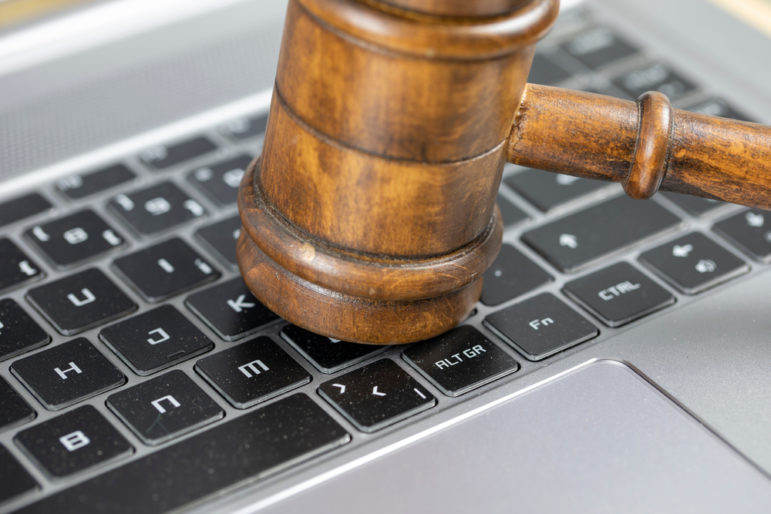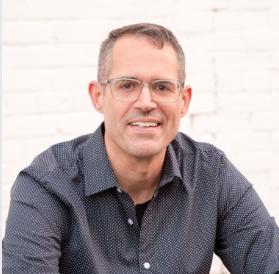

Image: Shutterstock
SLAPP Fight: How Journalists Are Pushing Back on Nuisance Lawsuits
Read this article in
Nestor Nga Etoga has made nearly 100 court appearances since 2016, leaving him little time to pursue investigative journalism projects.
The Cameroon-based journalist reported on potential labor and human rights violations by an international timber company. The company responded with defamation and false news lawsuits that have dominated Etoga’s life for the past five years.
“These trials have generated by their nature an acute psychological suffering characterized by a permanent anguish that inhabits me as well as the worries of my relatives, my wife, and my six children,” Etoga said in an email. “There is the closure of my weekly investigative magazine Le Renard and the technical leave of all the staff, the lack of time to deploy in the field for new investigations, the loss of professional earnings, and the rupture of my contracts.”
Etoga said he has spent roughly the equivalent of $35,400 USD on legal fees. His experience is not unique. SLAPPs — an acronym for “strategic lawsuits against public participation” — are an increasing threat to journalists around the globe.
“There certainly appears to be a worrying trend around the world where powerful companies or public officials attempt to censor public participation on matters of public interest through lawsuits, for instance in the law of defamation,” explained Dario Milo, a South Africa-based attorney who specializes in communication law, and is a member of the European Union’s Expert Group on SLAPPs.
A Business & Human Rights Centre report examining SLAPPs around the world between January 2015 and May 2021 found that these lawsuits are most prevalent in Latin America and Asia. And almost two-thirds of all cases worldwide involved criminal charges.

SLAPP lawsuits are increasingly a global problem. Image: Screenshot (Business & Human Rights Resource Centre)
These intimidation lawsuits are increasingly tied to industrial firms, such as mining, agriculture, and logging, the report found, creating increasing pressure on reporters who cover environmental and human rights concerns.
Joanna Connolly, a legal officer with London-based Media Defence, came to a similar conclusion.
“We get a sense that there’s a playbook that’s used,” she said. This is especially true in the UK, which has notoriously lax libel laws that place the burden of proof on the defendant. “And once you start to realize that it’s effective, it becomes more and more common. I mean there are entire law firms based in London just dedicated to plaintiff defamation lawsuits. It’s a business model, in a sense, for lawyers as much as it is useful for those who pursue it.”
As with Etoga, the experiences of journalists Ana Poenariu and Suchanee Cloitre support these conclusions.
Cloitre, who is based in Thailand, looked into claims by Burmese workers that they were being abused at a chicken farm in her country. Officials opened a slavery investigation regarding the farm’s practices. When a labor court awarded the workers 1.4 million Thai baht ($43,370 USD), she retweeted the news that the workers had won a “slavery case.”
“The owner of the farm didn’t like to hear that, so he had filed litigation to the local court where the farm is situated against me for criminal libel,” Cloitre wrote in an email.
Cloitre was initially sentenced to two years in prison. An appeals court dismissed the ruling but she now awaits the Thai Supreme Court’s decision. Thailand, according to the Business & Human Rights Resource Centre, leads the world in SLAPPs, with 49 in the past five years.
Cloitre said the lawsuit has haunted her and made her question her abilities as a journalist.
“I was afraid,” she wrote. “I was thinking how it can happen in this way, as I am a journalist and have no personal issue with the owner? I was pregnant at that time too, so I was extremely emotional and excessively scared.”
Ana Poenariu, who is Romanian and reports for GIJN member organization RISE Project, faces a €500,000 ($590,000 USD) defamation lawsuit. This legal threat arose after she reported that a private Romanian company, BSG Business Select, and its owner, Simona Cuilavu, purchased defective COVID facemasks from a firm in Turkey and then sold them for a profit to a state company.
A court ruled in favor of Poenariu in July, but BSG and Cuilavu can appeal.
“It’s stressful when you see that people are asking for half a million Euros,” she said. “You are thinking, ‘Oh man, I’m not going to make this money in this life.’”
Poenariu said her case is just one of an increasing number of SLAPPs in Romania.
“I’ve noticed that lawsuits like mine are becoming more frequent in Romania,” she said.
Anatomy of a SLAPP
No strict definition of a SLAPP exists, which presents a challenge for courts, lawyers, and journalists, Connolly said.
SLAPPs often include an imbalance of power between the person who files the lawsuit and the journalist. The lawsuits often request disproportionally large damages, include endless pretrial motions to increase the legal costs, and engage in forum-shopping, which means the petitioner looks for the jurisdiction that is most advantageous to their case.
Threats and intimidation are also common. “[They’re] going after a journalist in their personal capacity as opposed to their organizational capacity — precisely because you’re trying to intimidate the speakers — if the claim is baseless,” Connolly said.
These characteristics were present in Mineral Sands v. Reddell, a February 2021 decision in which a South African Court called out an Australian mining firm’s lawsuit against environmental attorneys and activists as a SLAPP.
“The mining companies are claiming inexplicably exorbitant amounts for damages, which the defendants can ill-afford,” Western Cape Deputy Judge President Patricia Goliath wrote in her judgment. “They instituted these proceedings fully aware of the fact that there is no realistic prospect of recovering the damages they seek.”
Milo, who was part of the legal defense team in the case, said the lawsuit might not be over, but the decision was crucial when it comes to SLAPPs.
“It’s an important decision, which, while not finding as a matter of fact that the case was a SLAPP case — because that is an issue that will be determined by the trial judge — [it] makes it clear that this kind of defense is available in South African law,” he explained.
Fighting SLAPPs
Like Cloitre, Poenariu said she faced times of doubt as the SLAPP case against her moved through the courts.
“You kind of start asking yourself, ‘Why are you doing this?’” she said. “And it’s not because you’re not sure about what you wrote, but you start asking life questions, because you don’t understand why people are doing this.”
She concluded that her work is an important public service, and she’s not going to stop doing it.
“I’ll do this again and again and again, and it doesn’t matter if they sue me again or not,” Poenariu said. “It’s really important. It’s the right of citizens to know stuff no matter the party, no matter the regime, no matter the political leader. It’s our duty to do this.”
Milo shared Poenariu’s sentiment that journalists should not be stopped by these lawsuits.
“The most important advice is not to be intimidated, because then the SLAPP serves its purpose,” he stated. “Practically, journalists who have been threatened with or are facing a SLAPP lawsuit should ensure they have good legal representation — experts in the field who are able to employ the necessary legal responses to the SLAPP suit.”
Poenariu also emphasized the importance of having representation that understands journalism.
She advised journalists to find “a good lawyer that actually reads your story and looks at the documents and talks with you about the issue.”
SLAPPs were first identified as a public threat to free expression in the United States during the 1980s. The expression SLAPP was coined by two US law professors. Concern over use of the lawsuits has increased steadily, resulting in a growing number of US states passing anti-SLAPP laws. Today, 31 states have anti-SLAPP statutes, which generally allow defendants to file for early dismissal and recover attorney’s fees and costs. Similar laws now exist in the Canadian provinces of British Columbia and Quebec, as well as one Australian territory. Some US states, such as California, allow defendants to file a so-called “SLAPPback” lawsuit, suing the filer of a SLAPP to recover damages for abuse of the legal process. The damages can be considerable.
But these examples of legislative pushback on SLAPP lawsuits are still the exception.
“While anti-SLAPP statutes exist in several states across the world, no EU (European Union) member state has so far enacted targeted rules to provide protection against SLAPP suits,” noted a 2021 report, signed by 60 European and international civil liberties and human rights organizations.
Connolly said she is working with others to create a network of lawyers in the EU who will offer pro bono services to journalists facing SLAPPs. The list is among several solutions she and her organization are working on.
Another step is making lists and creating campaigns that identify people and groups that repeatedly file SLAPPs. The Business & Human Rights Rights Resource Centre identified Thammakaset, a Thailand-based firm, as the most prolific SLAPP filer. The firm filed 31 SLAPPs in five years. Inversiones Los Pinares, based in Honduras, was second with 22.
“We’re noticing people trying to go on the attack a little bit more,” Connolly said about the rise of anti-SLAPP activism. “Really trying to build advocacy campaigns naming and shaming those who are bringing SLAPP lawsuits.”
Another approach is educating journalists — particularly freelancers or those who work at smaller organizations — about their rights, ensuring they are not intimidated by letters that threaten lawsuits or by lawsuits themselves.
“If you’re a smaller operation or a freelancer, some kind of pre-publication checklist is always good to do because it means when a SLAPP letter comes through the mail you know you’re in a good position to sort of face that down,” Connolly said.
This past June, a European Parliament working group drafted an anti-SLAPP model directive, recommending it be adopted and be made part of EU law. The directive defines an “abusive lawsuit against public participation” as:
“A claim that arises from a defendant’s public participation on matters of public interest and which lacks legal merits, is manifestly unfounded, or is characterized by elements indicative of abuse of rights or of process laws, and therefore uses the judicial process for purposes other than genuinely asserting, vindicating or exercising a right.”
The EU draft directive sets a framework for lawsuits that fit the criteria to be dismissed before the defendant loses substantial money and time fending off the lawsuit. The approach tracks with laws in many places in the US. Goliath listed multiple US state laws as guides for her reasoning in the Mineral Sands decision in South Africa.
Creating laws — such as those the EU is discussing, and some US states have adopted — is one option, Milo noted, emphasizing the need for a preliminary way to determine if a case is a SLAPP. Another strategy is to create a judicially recognized common-law defense against such lawsuits, as was recognized in the Mineral Sands case.
Cloitre said she supports anti-SLAPP laws, emphasizing that without them the public will miss out on important human rights information.
Journalist must bear the responsibility of carefully publishing their pieces, but when it comes to very sensitive issues like human rights, there should be some basic protections for reporters covering those issues, Cloitre said. “I said I was scared. Think about it: what if 10,000 human rights reporters around the world are scared? How can the victims’ voices be heard?”
Maxime Domegni, the Francophone Africa Editor for GIJN, translated Etoga’s interview from French to English for this report.
Additional Resources
A Journalist’s Guide to Avoiding Lawsuits and Other Legal Dangers
How to Successfully Defend Yourself in Her Majesty’s Libel Courts
India: Using Legal Action to Silence Journalists
French Journalists on Trial for Calling Azerbaijan a Dictatorship
 Jared Schroeder is an associate professor of journalism at Southern Methodist University in Dallas, Texas who specializes in examining freedom of expression in an era defined by difficult questions about artificial intelligence, the flow of information, and questions concerning platform regulation. He is the author of “The Press Clause and Digital Technology’s Fourth Wave.”
Jared Schroeder is an associate professor of journalism at Southern Methodist University in Dallas, Texas who specializes in examining freedom of expression in an era defined by difficult questions about artificial intelligence, the flow of information, and questions concerning platform regulation. He is the author of “The Press Clause and Digital Technology’s Fourth Wave.”










